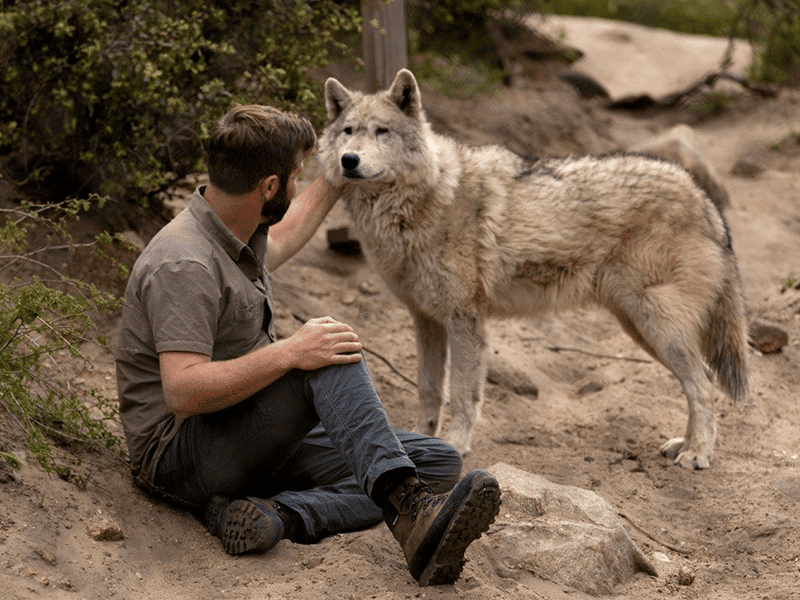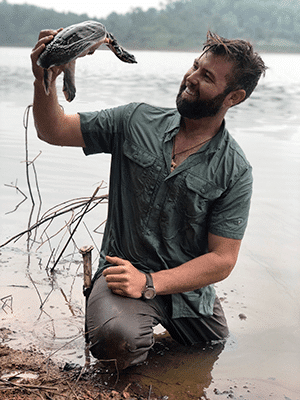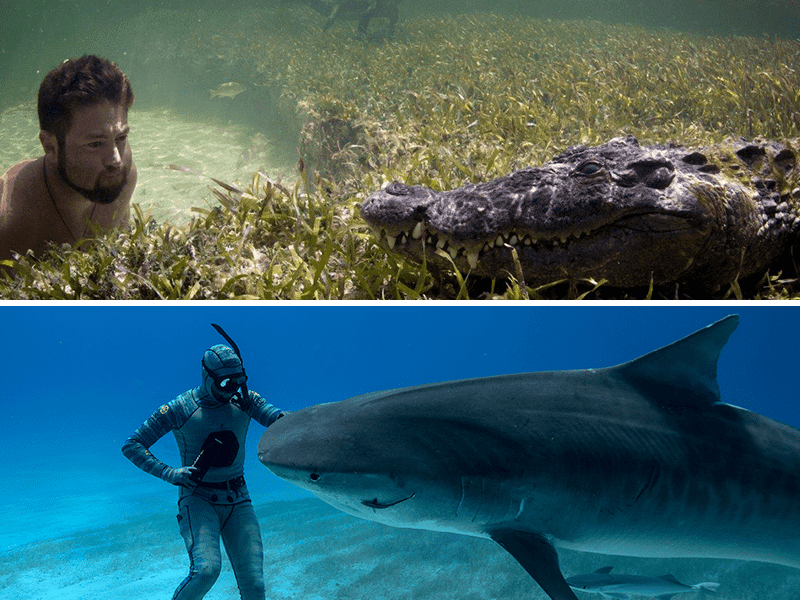From a young age, Forrest Galante has been obsessed with animals. Now as host of Animal Planet’s Extinct or Alive, Galante’s mission is to travel to ends of the earth to bring what is originally classified as extinct animals back to life. Within a short amount of time, Galante has made tremendous strides discovering the Zanzibar Leopard in 2018 and the Fernandina Tortoise in 2019.
As animal extinction and conservation continue to be as topical as ever, Galante’s persistence on championing the cause goes well beyond his profession- it’s his passion and life goals. Ahead of the new season of Extinct or Alive Millennial caught up with Galante to learn what makes animal preservation and the environment so special and how he puts himself in extreme situations in pursuit of them:
How did growing up in Zimbabwe shape who you are today?
Growing up in Zimbabwe did indeed shape me as a person. I was barefoot running wild either on my farm or at camp where my family had a safari business. While most kids had the luxury of TV and video games in their bedrooms, I had 14 terrariums and aquariums full of reptiles and fish I had caught in the bush and a pet vervet monkey who was found abandoned in a field. My life was very wild as a young man.
It was there I realized my passion for and dedication to wildlife, but it was not until I was forcefully evicted from my home and country and shoved into a very foreign American system that I really realized that nothing was insurmountable.

How do you determine which animals to investigate?
It’s a very long, drawn-out process. We weigh all the variables and if it checks all of the boxes, we decide to go on an expedition to search for it. The considerations include:
- Are there reported sightings of the animal?
- When did it get declared extinct/ how was it declared extinct?
- Is there enough habitats to support a population?
- Are people visiting this region?
- Is there a healthy enough ecosystem (prey, food sources, water, etc.) in place to support this creature?
- Is there hunting pressure?
If all of these boxes get checked then we go for it, but at the end of the day, I just have to trust my gut instinct. More than once the answer has been “no” to a number of these and we have gone for it anyway and had some major success!
What kind of training and preparation goes into these expeditions? Both mentally and physically.
The mental aspect is the most difficult. You have to go against the grain with what everyone is telling you is impossible. Failure is an expected result when you have a one-in-a-million shot of success (like say finding an extinct animal) but you have to give it you’re all anyway and trust your instinct.
The physical aspect is like any other you have to train for the conditions you are going to face. When I train for expeditions, I have to train my body to be ready to push beyond any ecological barriers. If I’m planning on going to a glacier no one has ever climbed I set muscle up and pull up numbers for myself. I train my forearm and wrist strength knowing that I need to wield an ice ax for hours on end. I will also put on lots of body fat knowing I will burn it off in the cold.

If I know I am going up a mountain that at 8700ft, I wear an oxygen deprivation mask while running
If I am planning on being in a steamy jungle for 3 weeks of river trekking, I wear a full sweatsuit and will sometimes be the guy doing pushups in the sauna just to acclimate.
If I know I have a desert trek ahead of me, I will run outside in the hottest sun I can and restrict my water intake to the point of complete dehydration. I learn about the habitat I am about to face and customize a workout plan for myself to prepare for it.
I am the guy in the gym people are very surprised by, looking at my bizarre outfits or exercises. When I spent 3 months doing nothing but forearms before my cave ascent in Vietnam, I basically looked like Popeye!
With animal extinction ever so topical, what is the best way for the average person to get involved?
The best way someone can be involved in conservation is by educating themselves to the hardships that wildlife and ecosystems are facing and learning to enjoy what’s around you. Making sustainable choices and learning about interesting wildlife in your own backyard inspires a great love for animals and preservation. If you want to be a bit more adventurous, there are great volunteer programs to help out and work with wildlife in almost every town as well as some fantastic opportunities (like GVI USA) to go do volunteer work aboard!
You don’t always find the species that you are looking for. What’s the takeaway when that’s the case?
It’s extremely hard to articulate the overwhelming amount of exhaustion and flat out disappointment that one feels when a mission comes to an end and the animal we are targeting has not been found. But it’s a big world, and just because I did not find it certainly does not mean it’s gone forever. The most important thing is to learn from our mistakes, marvel at and protect what’s left and hold out hope. It’s the hope that it’s not too late for the species, the hope that what we have found will make a difference to conservation and the hope that we can right our wrongs and do everything in our power to save the remaining creatures that exist in each ecosystem.
When you come to an experience that invokes fear how do you handle these situations?
Calmly. I’ve never been one to panic and that has served me very well in life. I do every now and then get faced with something scary, but I usually just take what I like to call “calculated risks” and work through it. Whether that’s unarming a drunken poacher in Taiwan or attempting to remove a taipan from an aboriginal villager’s house, these run-ins can be scary, but the actions are necessary. Also, as a leader of a team, I really can’t show fear or my whole crew falls apart. If I am a rock, my team knows everything will be ok.

You’ve been working with universities and organizations for quite some time. How does that help you?
Tremendously! I am a jack of all trades, master of none! My specialties allow me to be extremely diverse, but at lots of conservation organizations and universities, there are people with far greater knowledge about the species we are looking for than myself. Specialists like this are amazing people to work with and I love bringing my own expertise to them. Together the collaborations generally lead to more success than trying to work by myself.
What can we look forward to seeing in the new season of Extinct or Alive?
Ohh man… so SOO much good stuff. This season is simply incredible! I don’t want to overshare but aside from the amazing natural history-changing finds there is amazing action, adventure, wildlife, and endurance that no other show I have ever seen on television can boast! I am very proud of not just the show but the science of what we have accomplished. I can very definitively say this year is to date, the greatest accomplishment of my life and I’m excited to share that with the world starting October 16th
Extinct or Alive new season returns to Animal Planet on October 16th.
